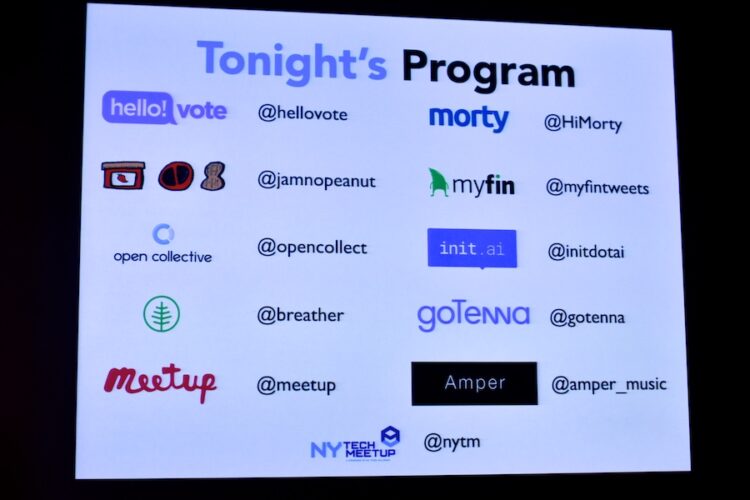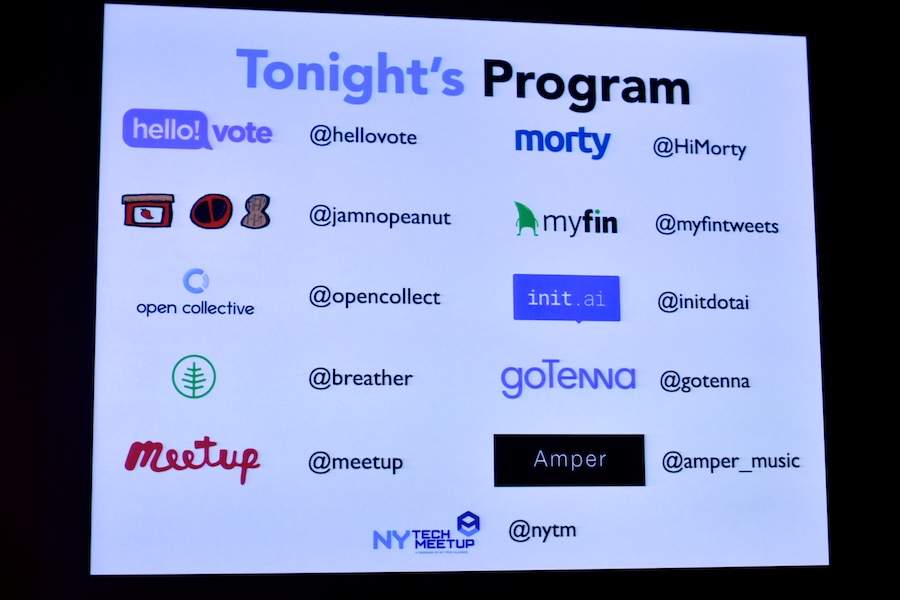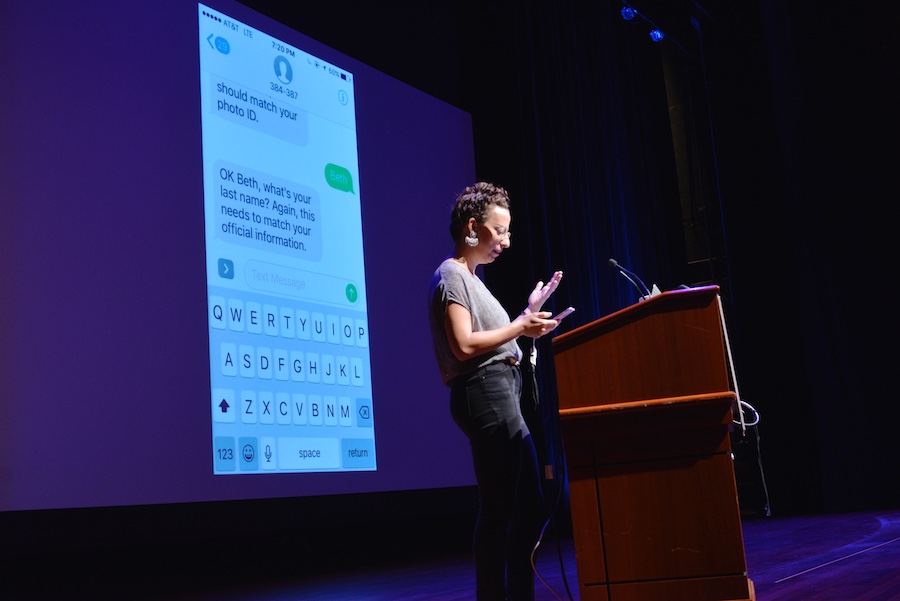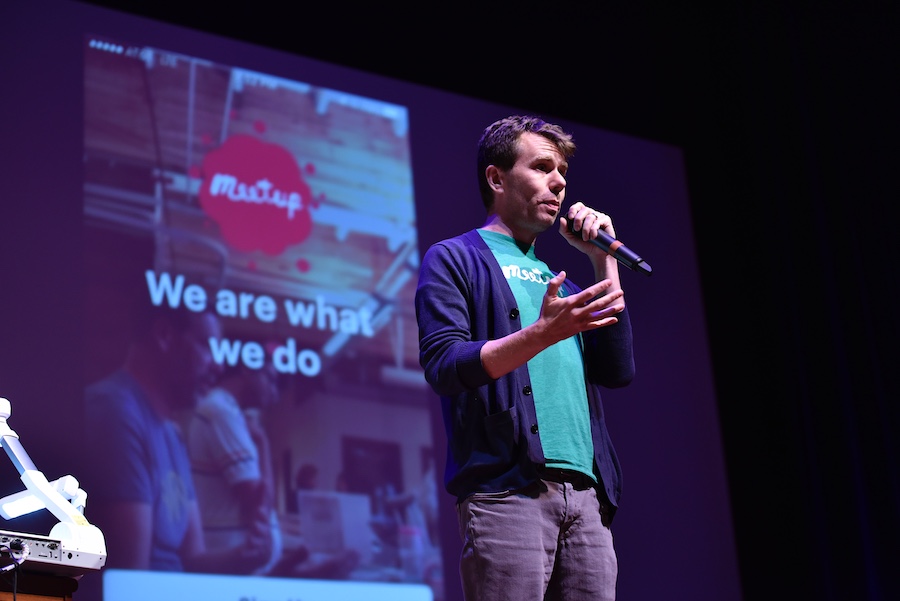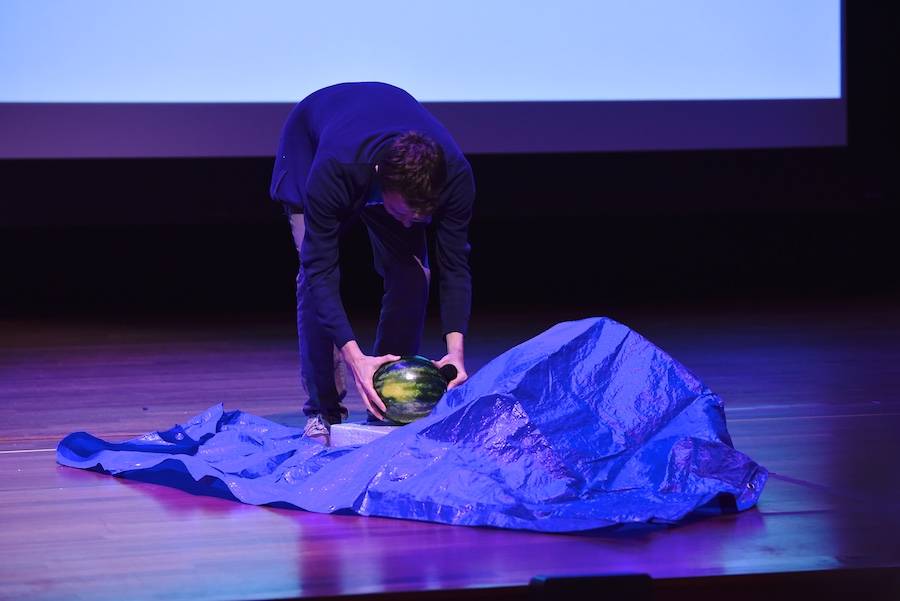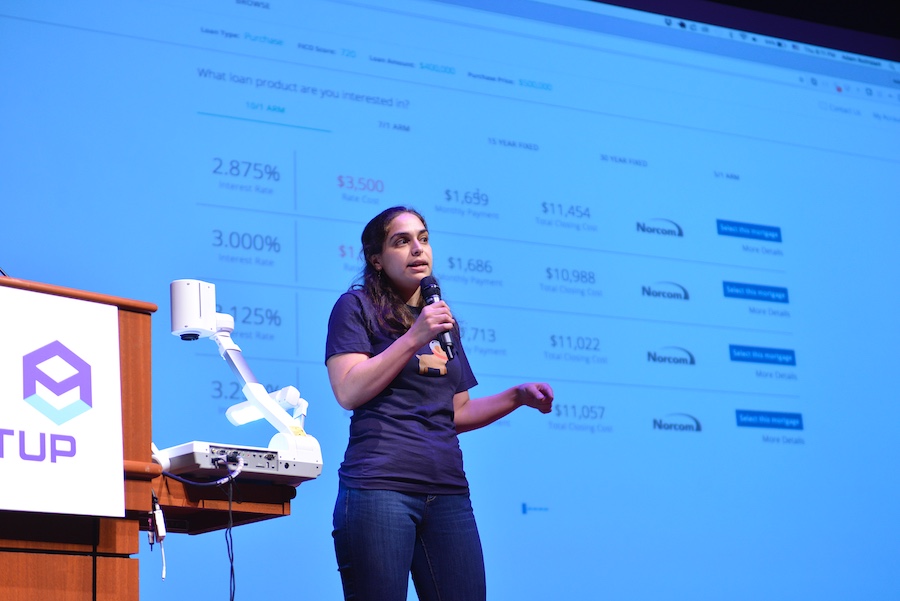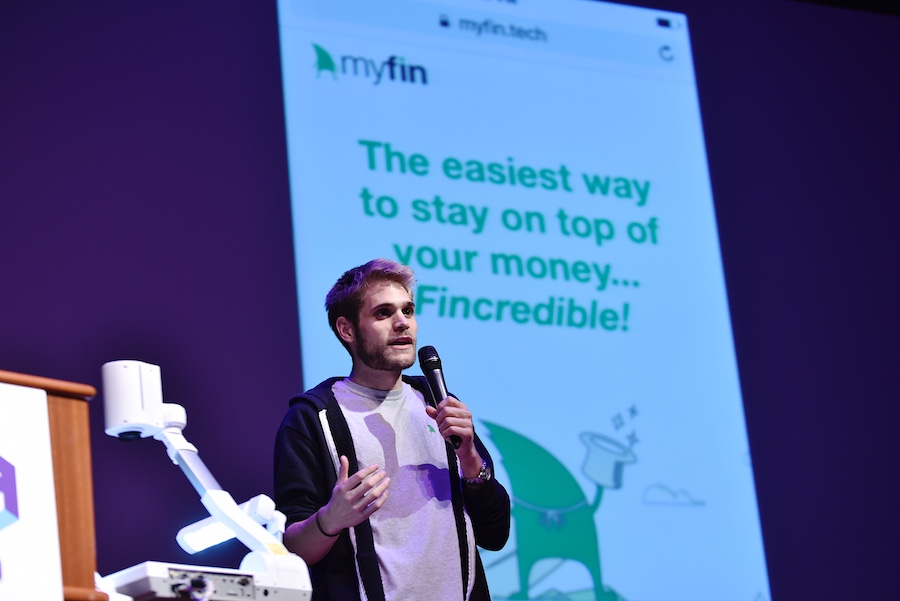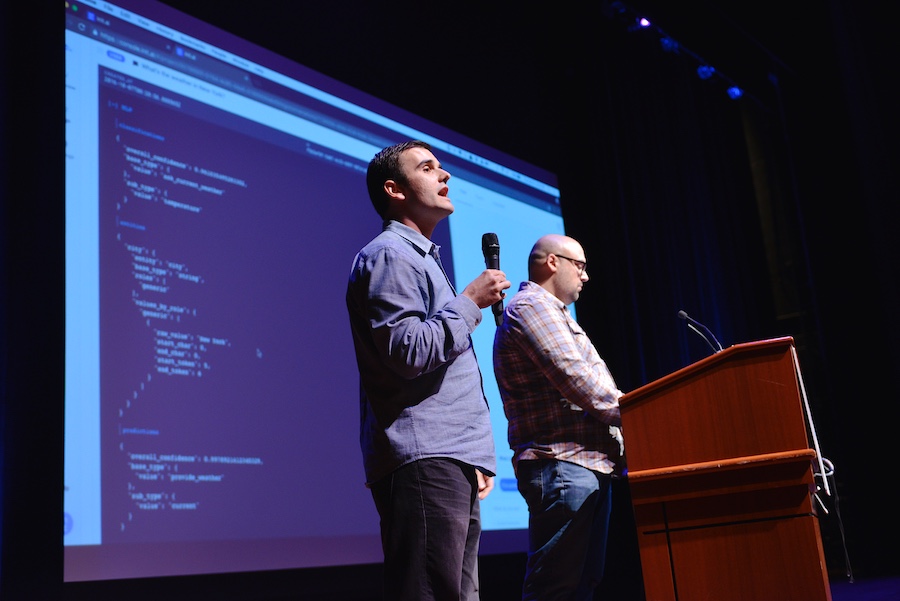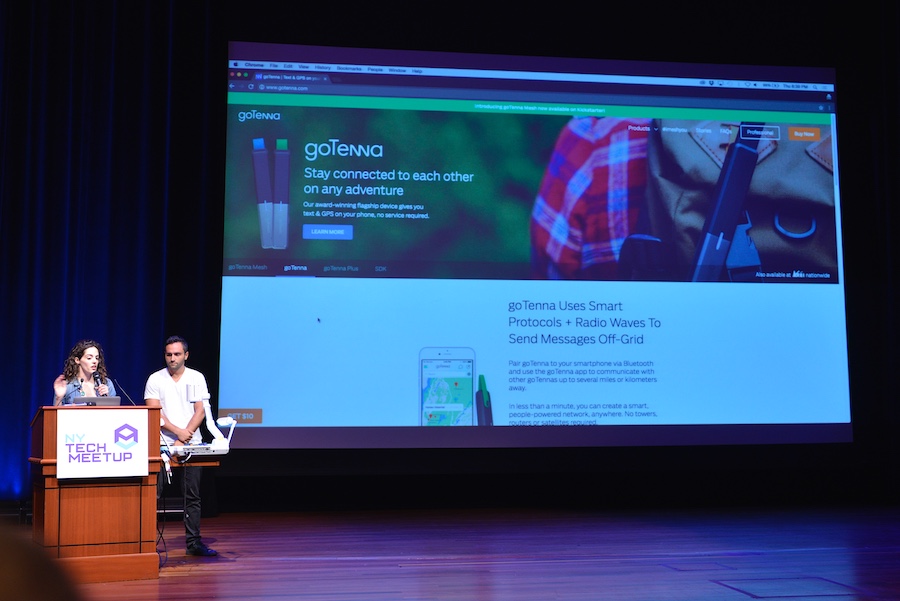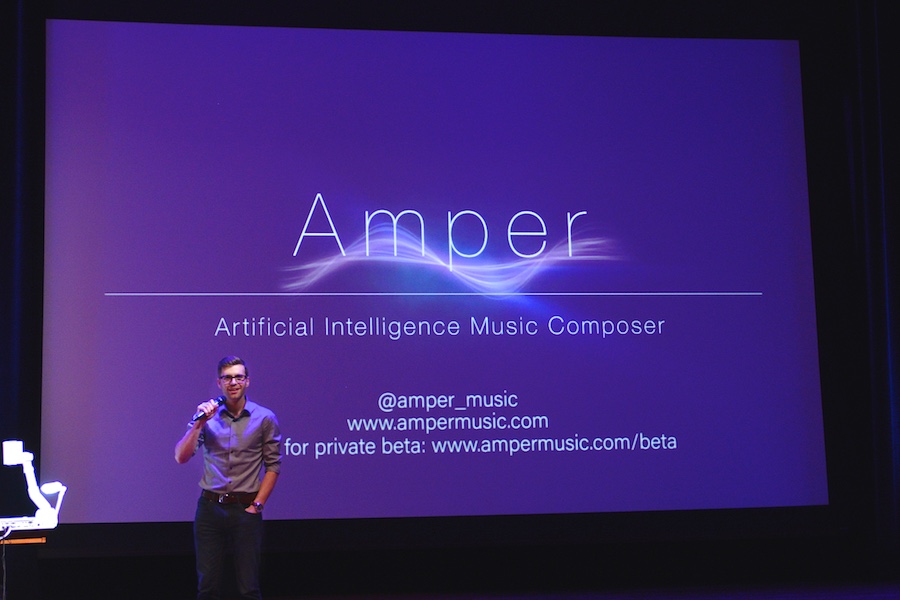With election day right around the corner it’s no wonder that engagement was the big theme running through this month’s New York Tech Meetup. Startups, artists and non-profits empowered by technology and driven to connect people in new and unique ways took to the stage for a night of fun, and at points unpredictable, demos.
CLICK HERE TO SEE WHAT WENT DOWN AT THE OCTOBER NYTM
All image credit: Craig Williston, QoolFoto
Following the civic trend, Elana Berkowitz cofounder of Hello!vote introduced their chatbot that gets users registered to vote right from their phones or Facebook Messenger. Elana explained that while one third of eligible voters are not registered over 90% American have smartphone. Traditional campaigns have focused on email, which has a dismal open rate of about 20% whereas text exceeds 90%. To get started with the processes, simply text hello, or hola por los hispanohablantes, to 384-387 and answer some basic questions. In some states your already registered at the end of the process and for the rest Hello!vote will email you prepopulated pdf with free postage to send in.
Continuing the trend of political activism, self-proclaimed rapper and revolutionary on front line of mass incarceration and police murder Jam No Peanut took the stage. Demoing his trap transmedia project ‘Ahmed Mohamed’, Jam No Peanut uses augmented and virtual reality to immerse his audience in the experience of 14-year-old Ahmed who was arrested last September on bomb suspicions for bringing a homemade clock to his school as well as highlight the school to prison pipeline. By scanning the cover art, users can select different multimedia experiences from the AR dashboard including a 360 VR reconstruction of the interrogation room Ahmed was held. Jam No Peanut then gave a live rendition of his single Ahmed Mohamed for what NY Tech Alliance CEO Jessica Lawrence Quinn declared “officially our first rapped demo.”
As an engineer and product manager for over 10 years, Open Collective cofounder Aseem Sood has used a lot of open source Github code. While many developers like Assem may want to contribute to these repositories, they may not have the time. Instead, Open Collective allows anyone to donate money to help support projects that matter to them. In addition to allowing recurring donation, the money sits with Open Collective and not individual contributors, avoiding issues with multiple bank accounts and allowing all payouts and expenses to be made public. Open Collective isn’t only for Github projects though. Meetups, and other community projects can use the platform to raise money, submit receipts and mange expenses. Following the night’s trend of engagement, Open Collective is sponsoring rides to polls on election day. Submit an Uber receipt to a polling station on election day and get reimbursed up to $15 dollars.
The meetup went meta as Scott Heiferman founder and CEO of Meetup.com and the New York Tech Meetup, came out to announce the launch of the new Meetup app and website. Scott declared meetup was one of the companies trying to save the world “With more division and more corrosiveness in the world, if you bringing people together they will mentor each other, fund each other and inspire each other.” Acknowledging the difficulty of finding relevant events in a sea of potential groups, Scott unveiled the upgrades that 100 engineers, designers and product people had worked on for over a year. The new apps, launched on both platforms, supports 6 languages and provides granular detail form high level categories like music down sub sections like folk music all the way down to live folk music in Brooklyn. As part of Meetups’ plan to grow the platform by ten times in the next few years, Scott demonstrated new machine learning tools improve group recommendations and help make it easier to start new ones.
Things took a turn as Scott moved to christen the new Meetup. A bemused audience watch as Scott brought a trash bag out on stage, laid out a tarp and withdrew a concrete block a sledgehammer and a ripe watermelon. Sensing their stage was about to be Gallagher-ed, the crew of NYU’s Skirball theater rushed out and seized the watermelon from the stage. Unfazed, Scott reached back into the trash bag and withdraw another watermelon sending the audience into a fit of laughter. Unfortunately, as he set up the second fruit, the stage crew scrambled back out and this time decided to strategically grab the hammer. As consolation, Jessica Lawrence Quinn asked Scott what act would have symbolized, to which he replied with a shrug and a smile, “I don’t know, the people need something to talk about.”
Next, the team from Morty showed of their fintech platform helping to match mortgage borrowers and lenders. The digital mortgage broker offers an improved experience over the average 47 days and $7,000 in closing costs of the traditional mortgage. The platform leverages modern data sources and APIs to build a buyer profile along with information from the user like location, home type, bank account, amount to borrow and so forth. Morty then uses 2 years of bank transaction history and a real time credit inquiry from all 3 major credit agencies to see what kind of products the user qualifies for. The user can see their decision score and application summary next to a populated list of loan products in the market place. Morty then lets user compare details and submit loan applications right from the page.
Recent Techstars alumni Nathaniel Harley kept the night rolling with his company MyFin. The CEO explained how the app helps make managing and saving money super easy hard by aggregating all your personal credit, checking savings and investment account from different provider into one dashboard. The app, in invite only beta at the moment, sits on AWS and connects with over 19,000 financial using the Plaid API. By consolidating spending and income data form all accounts, the app keeps track of total cash flow showing exactly how much you made and spent and if you’re up or down for the month. The app also helps users mange personal finance tasks from simple things like keeping track of who owes them venmo to setting monthly spending and savings goals.
Techstars alumni continued to have a strong showing as Init.ai cofounders Keith Brisson and Kyle DeTella struck up a conversation about their conversational AI platform. Init.ai provides tools to quickly build, train and deploy conversational nlp applications for business. The developer focused platform, recently out of private beta, uses a git based workflow and provides basic tutorials for those starting out with nlp apps. Init.ai is built to deploy conversational apps across as many text based platforms as possible including sms, Facebook Messenger and Line. The system creates langue models by sending chat log data to a bank of GPUs to train a unique neural network for each app.
The night wrapped up with a demo by GoTenna, a hardware company offering a portable, fully encrypted, off the grid network. Their new product GoTenna Mesh, announced last week and available on Kickstarter, offers the same personal network but now relayed through other users of the product. While their first generation product couldn’t send messages out of network when not connected to cellular data, if a GoTenna Mesh user is in a three-mile range of another user connected to the regular network their data will be relayed through them. Additionally, the team announced a new open SDK, allowing developers come up with clever uses for the new network. With a full usage battery life of 28 hours, the product is currently deployed in India and Syria by non-profits where field communication is critical and local infrastructure is unreliable.
Rounding out the night, Amper Music showed off their collaborative music composition platform that uses AI to create the perfect clip. Replacing the tiresome process of searching stock music clips for the right style and length, Amper Music allows uses to uniquely generate the perfect soundtrack for scoring videos. After selecting parameters like style, mood and length of the clip, the platform generates a unique track from its proprietary library of ever note from 200 different instruments. The pro version of the tool has the same features, but allows more specific instrument control and layering, allowing users to upload entire video to score. To avoid intellectual property issues, Amper holds the copyright to the audio but grants users a global perpetual use license for any track generated.


